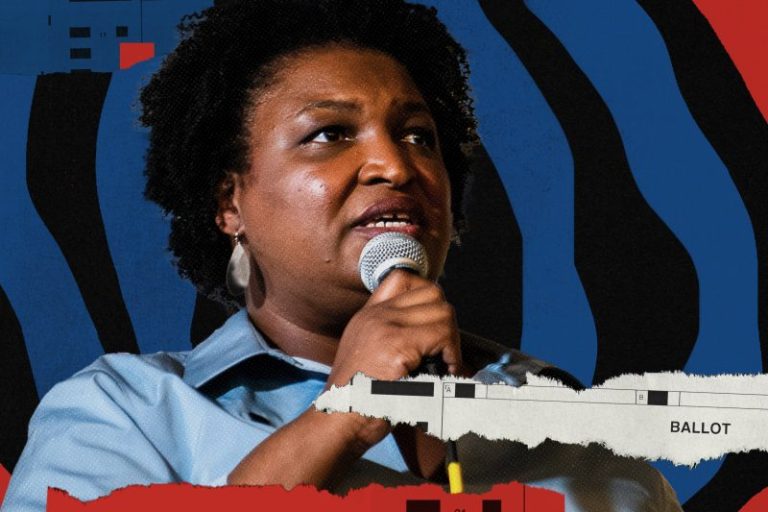The morning after the midterm elections, Nimay Ndolo woke up thinking about Stacey Abrams.
“I just hope that she’s okay,” said Ndolo, an online-content creator in Smyrna, Ga. “I hope she’s sitting in bed with some Starbucks. I hope her feet are up. I hope she’s talking to her mom, talking to her family.”
Most of all, Ndolo said, she hopes Abrams knows that Black women are proud of her: “I hope she doesn’t feel like she failed us.”
Abrams lost her rematch bid in Georgia’s gubernatorial race Tuesday night to Republican incumbent Gov. Brian Kemp. Some Black women and activists called it a devastating blow for Abrams, 48, a Democrat who has dedicated her career to mobilizing voters in Georgia — an effort credited with helping flip the state blue in the 2020 presidential election.
The outcome also, some said, reaffirmed a message about the racial and gender gaps that persist for Black women.
“We always have to work 10 times as hard as our White counterparts,” said Kristyn Hardy, an attorney in Atlanta. “And not only do we have one strike against us that we’re Black … we’re also a part of a second marginalized group because we’re women. And so it always seems like we’re getting the short end of the stick.”
For Ndolo, “it feels like a punch in the gut,” she said. “I was kind of hoping for a win for her, a win for all Black girls.”
Abrams, who was elected to the Georgia house in 2006, rose to become its minority leader before her first governor’s run, in 2018. This election cycle, she centered voting rights, Medicaid expansion and abortion rights in her campaign against Kemp; Black women told The Washington Post the latter issue, following the Supreme Court’s recent Dobbs decision, earned their support.
Black women such as Abrams have long pushed national Democratic campaigns to invest in Georgia and other Southern states, laying the organizing groundwork to galvanize voters of color. Along with Abrams, Black leaders like LaTosha Brown, Nsé Ufot, Helen Butler, Ashley Robinson and Christine White have led voting rights efforts and grass-roots organizations in Georgia.
“There’s just so many Black women who are out here toiling and working every day to move the needle for everyone in Georgia,” said Kendra Cotton, CEO of New Georgia Project, a nonpartisan civic engagement organization founded by Abrams in 2014. “They have been visionaries and are dominating these efforts across the state.”
Their efforts include flipping Georgia blue in landmark races, bringing critical victories for candidates such as President Biden and Sens. Jon Ossoff and Raphael G. Warnock — who following Tuesday is headed to a runoff against Republican Herschel Walker, after Warnock won in another runoff in 2021.
Warnock “stands on her shoulders,” Cotton said. “We have to take into account what she did when she germinated a lot of these entities in our progressive ecosystem here in Georgia.”
The question was whether the voters Abrams sought to mobilize would turn out.
In the lead-up to the election, a key base of Democrats had expressed concern about Abrams’s support among Black men. But early exit poll data Wednesday showed Abrams winning 90 percent of Black voters in Georgia, including 93 percent of Black women and 84 percent of Black men, nearly identical to Warnock’s support among both groups in the state.
But certain conditions of the race made Abrams’s rematch more challenging than in 2018, when she ran for an open seat in a historic bid that catapulted her to the national spotlight, said Andra Gillespie, a political scientist at Emory University in Atlanta.
“Fast-forward four years, and she’s not running against another person who has never been governor before — she’s running against an incumbent this time,” Gillespie said of Kemp. “And she’s running against an incumbent who had kept his campaign promises and for whom Republican voters were really satisfied. There’s a familiarity with his leadership.”
There was also a familiar set of obstacles, she and others suggested, considering Abrams’s identity as a Black woman. In the coming days, she said, there will probably be speculation on whether opponents judged Abrams too harshly.
“That is a conversation worth having,” Gillespie said. “She has a different set of disadvantages and, actually, even a different set of attacks that can be levied against her because she’s a Black woman.”
Gillespie pointed to the long slate “of Black women who were running for very high-profile state offices.”
“If we look at the Senate races with Cheri Beasley and Val Demings, I think, in particular, there was a frustration that Democrats did not invest enough resources in Florida and North Carolina Senate races,” she said. “It wasn’t just that Abrams lost.”
Or as Alexus Cumbie, a writer and political strategist based in Birmingham, Ala., put it: “For another election season, Black women continue to be the backbone of the Democratic party, but not the face of it.”
Cotton, the New Georgia Project chief executive, said the work to galvanize more voters of color is far from over.
“The South is going to be a tough nut to crack,” she said. “We are trying to expand the electorate among the Black and Brown folks who already feel disconnected and left behind. The ground is still fertile and ripe to get those folks involved in the electoral process. So our mission hasn’t changed.”
Nor has Abrams’s. “While I may not have crossed the finish line, that does not mean we will ever stop running for a better Georgia,” she said in her concession speech Tuesday night. “We will never stop running for the truth that we know to be true, for the people we know need to see us.”
Ndolo said she’s inspired by Abrams’s resilience. And she finds that familiar, too.
“She reminds me of my older sister. She reminds me of my younger sister. She reminds me of my mom,” Ndolo said. “She is that woman.”

